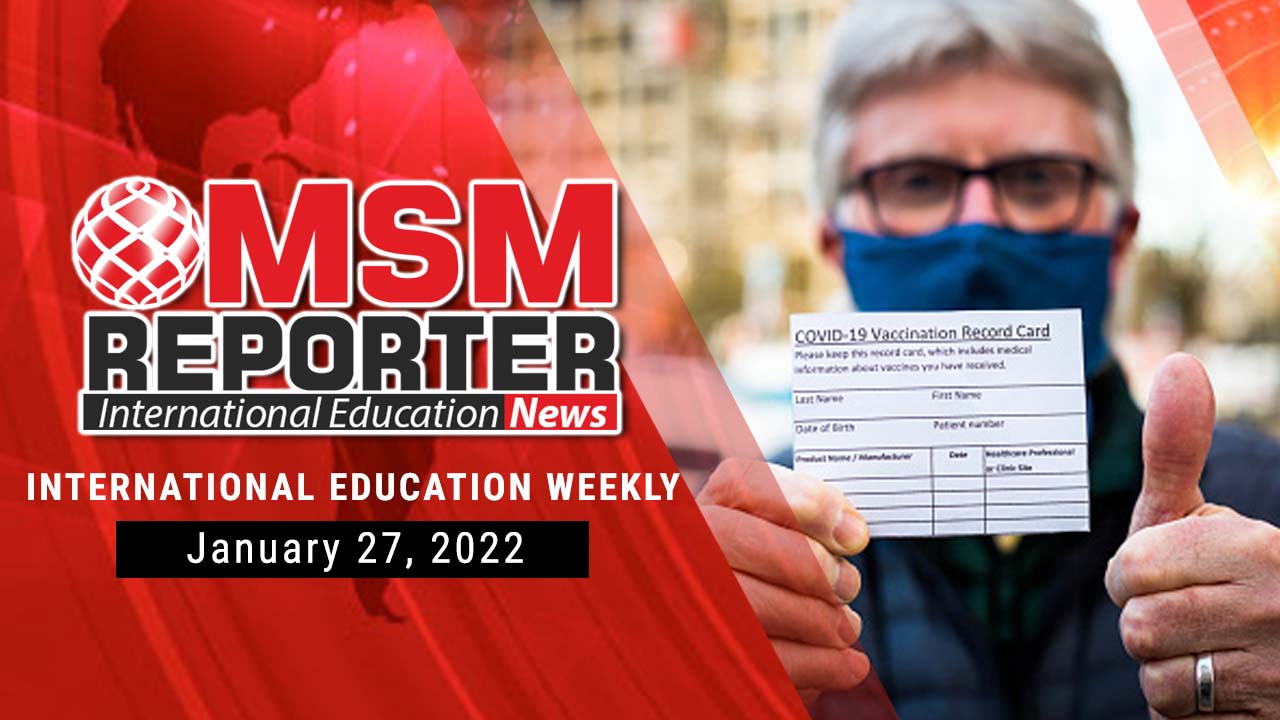Note From the Editor
While the global higher education community faces a myriad of challenges caused by public health emergencies and geopolitical unrest, higher education institutions, student and faculty unions, the government, and even some from the private and non-profit sector remain eager to collaborate in alleviating the difficulties faced by global learners.
Additionally, the easing of restrictions and implementations of hybrid learning spark a cautious hope that the whole world may soon rise back up from the dire effects of COVID-19 in the education and livelihood of many international students.
Drop in College Enrollment Threatens To Cause Long-Term Economic, Social Consequences
Researchers warn that the sharp and persistent decline in the number of Americans going to college could alter American society for the worse. Nearly a million Americans are recorded to have not enrolled since the start of the pandemic, and nearly 3 million over the last decade. Dean of Miami University’s College of Education, Health and Society Jason Lane said that the low numbers of enrolled Americans is a widely unrecognized crisis. He added that if fewer people go to college, society is going to be less healthy.
Acadia Students, Faculty Call for Flexible Learning Options as In-Person Classes Resume
Amid calls for a flexible learning environment as in-person classes resume, an Acadia University official stated that hybrid learning is permitted for professors who can accommodate. As in-person learning is preferred, Acadia’s director of communications emphasized that the delivery method is encouraged by public health and strict health and safety protocols are in place. While some members of the faculty and students have concerns around in-person learning considering the omicron variant situation globally, some international students lean more on in-person learning.
Lifting Travel Test Requirements for the Vaccinated – United Kingdom
As their way of stepping back to normality, British Prime Minister Boris Johnson announced that COVID-19 testing requirements will be removed for vaccinated people arriving in England. Prime Minister Johnson also wants to show that their country is open for business and for travelers, which may have more appeal for international students who are interested in entering England. Other parts of the UK – Northern Ireland, Scotland, and Wales – set their own health policies but implement and adopt the same travel rules as England.
EU and US Warn Against Travel to Australia Amid COVID Case Surge
The European Council has removed Australia off its “white list” for restriction-free travel and dubbed the latter as a “COVID danger zone.” This move means that the Council has recommended that members of the European Union restrict access to their countries from Australia for non-essential purposes. Meanwhile, the U.S. Centers for Disease Control and Prevention (CDC) has moved Australia into its highest-risk Level 4 “Do Not Travel” category for travel.
Lisa Singh: First Woman of Indian Origin Elected as a Senator to the Australian Parliament
The first woman of Indian origin who won as a senator in the federal election in August 2010 stated in an interview that Australia will bounce back as a favorable destination for Indian and other international students. Plans to welcome the students back have been launched, but arrival policies need to be pushed through policy measures. To express support to international students, the Study Melbourne Hub initiative has been launched during the lockdown. The Victoria government supported bursaries at universities and provided emergency relief funds that helped international students during the lockdown period since they can’t go out to work.
Biden Administration Makes Visa Changes To Retain Foreign STEM Students
The Biden administration is making a series of policy changes aimed at easing the path for foreign students and professionals in the fields of science, technology, engineering, and math to remain in the United States on a long-term basis. The senior administration officials said that the new policies are designed to retain foreign students educated in the United States in STEM fields to boost innovation while keeping pace with competitors such as China. The most significant of the changes will expand the number of disciplines that international students can study to qualify to work in the United States on their student visas. With the change, students in those disciplines will be permitted to work in the country for three years after graduation, rather than the one year offered to all international students.
The Pandemic Exposed the Vulnerability of International Students in Canada
A survey done among international students in Canada showed that most of them experienced psychological, academic, and financial vulnerabilities. While the Canadian government is known to be comparatively generous in providing eligible global learners $2,000 per month from the Canada Emergency Response Benefit, the survey suggested that universities and colleges may need to provide more accessible and culturally competent mental health services that are targeted to needs of international students.
No Going Back to Business as Usual?
An Ernst & Young survey revealed 86% of Gen Y and Gen Z respondents in India admitted that the way they used technology changed during the pandemic. Globally, the percentage is at 77% among Gen Y and Gen Z for the same survey data point. Additionally, 44% of the Gen Y and Gen Z respondents expect the pandemic-induced changes to remain permanently. These survey findings prompt higher education institutions to ensure that they are adapting to the fast-paced innovations in education technology to remain relevant considering there are “terabytes of great content” accessible to students through the internet.
International Day of Education 2022: UAE Students, Teachers Call for More Collaborations
Despite the pandemic-induced disruptions in the education space, students and educators in the United Arab Emirates expressed optimism during the International Day of Education. Apart from acknowledging the progressive transformations prompted by stay-at-home orders, such as virtual learning, an education official in the UAE also considers the International Day of Education as an opportunity to address inequality and learning losses amid the global health crisis.
Unvaccinated University Student Voices Concern After Being Dropped From Courses Months Before Grad
With the cautious optimism for a safe return to in-person learning, most higher education institutions in Manitoba, Canada require students and faculty to be vaccinated and boosted. On top of these, students are also required to undergo rapid testing twice a week. While there are concerns among some unvaccinated students, especially those who are near their graduation, students who have not yet received vaccinations are deferred to fully online classes and deregistered from in-person courses.
Afghan Students in US Face Uncertain Future
Although the government of the United States has offered special immigration and entry procedures to help Afghans settle in the country, some Afghan students under the Fulbright scholarship feel uncertain about their future as one of the scholarship’s policies states that they must return to their home country after their program. Some Afghan students taking their master’s are eyeing to pursue doctorate degree scholarships to stay in the United States as they deem it unsafe to fly back to the Taliban-ruled Afghanistan. The U.S. government offers a humanitarian parole program that allows individuals to enter the country without travel documents, a program that may be applicable for Afghan refugees.
Featured Institution: Acadia University
Acadia University is a public university located in the heart of Wolfville, Nova Scotia in Canada. Its campus houses the Acadia University Art Gallery and Acadia University Archives. Additionally, it offers over 200-degree combinations in the faculties of Arts, Applied and Pure Science, Theology, and Professional Studies. With a student-faculty ratio of 15:1 and an average class size of 28, Acadia University makes sure that each student will receive adequate attention, equipping them with an optimal training ground in their chosen fields.
Featured Program: Master Of Public Health (MPH)
Hawai’i Pacific University’s (HPU) Master of Public Health (MPH) is an interconnected and multifaceted field that operates in both public and private sectors to improve the well-being of communities, families, individuals, and nations. MPH graduates from HPU are positioned and trained to work from local to international government agencies, health care facilities, corporate settings, community coalitions, non-profit health organizations, and educational institutions. The MPH course is also known as one of the most employable and powerful advanced degrees available that international students can take advantage of.




